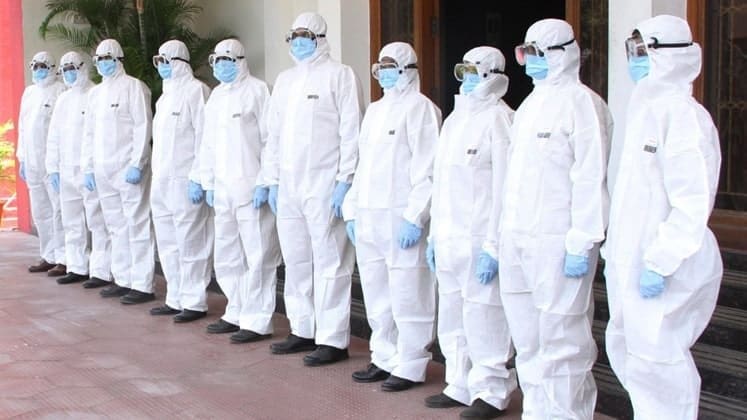Thanks to the Covid-19 pandemic, a new market, estimated to be worth at least ₹10,000 crores, has popped up from nowhere.
The COVID-19 pandemic is the defining global health crisis that the world is currently facing. The virus has spread all over the world, and the number of cases is rising every single day as governments work to slow its spread. The global response to the unfolding COVID-19 crisis saw countries implementing countrywide or partial lockdowns, the announcement of stimulus packages, and relief measures to tackle the harsh economic impact of the pandemic. The virus also overwhelmed the global production capacity of PPE which is the most critical product to protect the front-line health workers and other responders. Surging demand for PPE kits along with a disrupted global supply chain amid the Covid-19 pandemic was putting lives at risk.
India moved quickly, implementing a nationwide lockdown with the goal of flattening the curve and using the time to plan resource responses, adequately. The Prime Minister assured the country that there are ample reserves of medicines, PPE kits, food, and other essential goods.
Starting from practically nothing only a few months ago, India has now become the world’s second-largest supplier of medical personal protective equipment (PPE). These are products like goggles, face-shields, masks, gloves, coveralls and gowns, head and shoe covers.
India used to rely on its importing services for medical and Safety purposes, CHINA being a lead market. After the pandemic hit there was a lot of confusion as “Was it ethical?”
and thereafter, China and India were also having conflicts at the Eastern Borders of India. well, in well India decided to produce its own equally and better PPE kits.
India realized the critical role of PPE in combating this pandemic as early as March, wherein the Ministry of Textiles stepped to lead the assessment of the availability of all protective wears for our frontline health workers.
What followed this, is a remarkable journey of collaboration between governments at the central and state levels, industries, and workers to revamp existing production lines to manufacture a completely unknown product, from scratch.
In 60-odd days, the industry grew over 56 times, Over 600 companies in India are certified to produce PPE that is only in the first 60 days. These include textile biggies such as Arvind, JCT Mills, The Trident Group, Welspun, and Shahi Exports. India today manufactures 4.5 lakh pieces of PPE a day, and now the country is well-positioned to seize a share of the global market, which will be $60 billion by 2025.
- From 0, India now produces nearly 4.5 lakh PPE kits every single day.
- In only 60 days, the PPE industry in India has witnessed 56 times of growth.
The Immediate action
How did the industry gather itself so quickly? Many give credit to the swiftness with which the government acted.
Harish Ahuja, Chairman and Managing Director of Shahi Exports, recalls getting a call from the Textiles Secretary in early April. Noting that Shahi Exports’ 58 plants in the country have been lying shut due to the Covid-19 pandemic, the Secretary asked Ahuja if he could take up the manufacture of coveralls — protective gowns, made of special, non-woven fabric.
Shahi Exports swung into action. Though only five of its 58 plants needed to be pressed into service and only 750 of its 1.2 lakh employees were used for the purpose, the company now makes 20,000 coveralls a day. It has so far supplied close to nine lakh pieces to HLL Lifecare of Kerala, the Central government’s agency for medical procurement.
The story is the same across the industry. A nudge from the government, an appeal for helping the country in the time of crisis, and a new business opportunity when none else existed, seem to have done the trick. “The textile industry working closely with the Government of India created an entire industry from scratch,” Kulin Lalbhai, Executive Director, Arvind Ltd, told BusinessLine. Arvind makes 15,000 coveralls a day from its plants in Bengaluru, Ahmedabad, and Ranchi.
As is always the case, there were challenges. Since before Covid-19 came, the PPE industry in India was very small or Rather nil, and all the raw materials used to be imported from China. But when the pandemic broke out and imports were not possible, the industry had to quickly develop a domestic supply chain. “We have been able to work with our suppliers to shift a large part of the supply chain to India,” Lalbhai said.
Ahuja notes that today all the raw materials, with the sole exception of sealing tapes, are available in India, which puts the country at an advantage over the principle competitors, Vietnam and Cambodia.
Of course, it helped that the industry already had the equipment. “Fortunately, we had all the machines needed to produce the coveralls,” Ahuja told BusinessLine. Shahi Exports, which is among the top textiles and garments exporters in the country, was also making rain-proof clothing. Likewise, Arvind was also into technical textiles — for which there was a big push in the recent Budget. The company used to make protective clothing for the oil and gas, medical and automotive industries. Thus, to ramp up medical PPE was but one step.
Today, India has an inventory of 15.96 lakh PPE kits (of all kinds) and another 2.22 crore kits are being manufactured against firm orders by the industry, according to the Invest India report. Bengaluru has become a major PPE hub, where half the production happens. The rest of it is spread across the country — Tiruppur, Coimbatore, Chennai, Ahmedabad, Vadodara, Ludhiana, Bhiwandi, Kolkata, Noida, and Gurugram.
What happens after the market is saturated? All the manufacturers that Business Line spoke to are confident of exporting. “Once we have enough for ourselves,” says Lalbhai, “there will be ample opportunities to export.” Likewise, Ashok Naik of Grassroot Markmen sees “huge potential in exports.”

